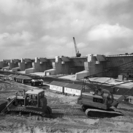How High is High Enough? Dutch Flood Defences and the Politics of Security
DOI:
https://doi.org/10.18352/bmgn-lchr.10365Keywords:
Security, Securitisation, Flood, Water, 1953Abstract
Why are Dutch flood defences as high as they are? And who has made that decision? These seemingly simple questions have complicated answers because they deal with issues of security. Increasingly, historians and political scientists point to ‘securitisation’ theory to help explain how some security issues are socially constructed as a threat and thereby dramatised as an issue that needs to be dealt with urgently. This article argues, however, for a focus on ‘desecuritisation’: the process by which measures are first suggested and then adopted to prevent the security breach from reoccurring, thereby allowing for a return to ‘normal’. Experts, we suggest, play a key political role in this process, which often remains under- or unstudied because it deals with specialist subjects such as economics or physics. In this article, we analyse the choices and compromises made by the Delta Committee in the wake of the catastrophic storm surge of 1953 in the Netherlands, and the way these were then shrouded in the language of absolute scientific certainty, leading the Dutch Government and Parliament to accept the committee’s recommendations without seriously questioning their basis.
Hoe hoog moet een dijk of dam zijn? En wie bepaalt dat eigenlijk? Antwoorden op die vragen hangen samen met visies op wat veiligheid inhoudt en de vraag hoe veilig iets kan of moet zijn. Historici en politieke wetenschappers die geïnteresseerd zijn in ‘veiligheidstheorieën’ doen dat steeds meer vanuit de gedachte dat bedreigingen voor die veiligheid het resultaat zijn van een politiek, intersubjectief proces waarbij een probleem tot een dringend veiligheidsvraagstuk wordt geconstrueerd. Dit artikel suggereert dat juist ook aandacht moet worden besteed aan ‘desecuritisatie’: het eveneens politieke proces waarbij maatregelen worden gesuggereerd en vervolgens goedgekeurd om herhaling van de dreiging te voorkomen en terug te keren naar de normaliteit. Dit proces vindt vaak (deels) plaats buiten de traditionele politieke arena. Hiervoor worden experts ingeschakeld die een zogenaamd apolitieke en wetenschappelijke oplossing dienen uit te werken. In dit artikel analyseren we hoe de Deltacommissie na de Watersnoodramp van 1953 haar desecuritisatiearbeid verrichtte: door politieke aannames te construeren en die vervolgens als rationele wetenschap te presenteren.
Downloads

Published
Issue
Section
License
Authors who publish with this journal agree to the following terms:
a) Authors retain copyright and grant the journal right of first publication with the work simultaneously licensed under a Creative Commons Attribution 4.0 International (CC BY 4.0) that allows others to share the work with an acknowledgement of the work's authorship and initial publication in this journal.
b) Authors are able to enter into separate, additional contractual arrangements for the non-exclusive distribution of the journal's published version of the work (e.g., post it to an institutional repository or publish it in a book), with an acknowledgement of its initial publication in this journal.
c) Authors are permitted to post their work online (e.g., in institutional repositories or on their website) prior to and during the submission process.
Authors are explicitly encouraged to deposit their published article in their institutional repository.








